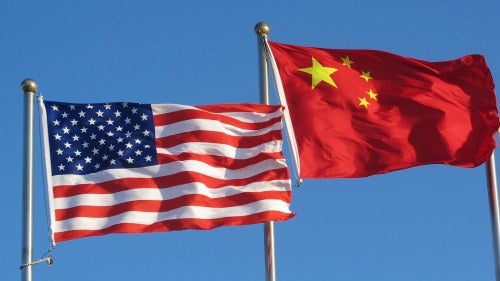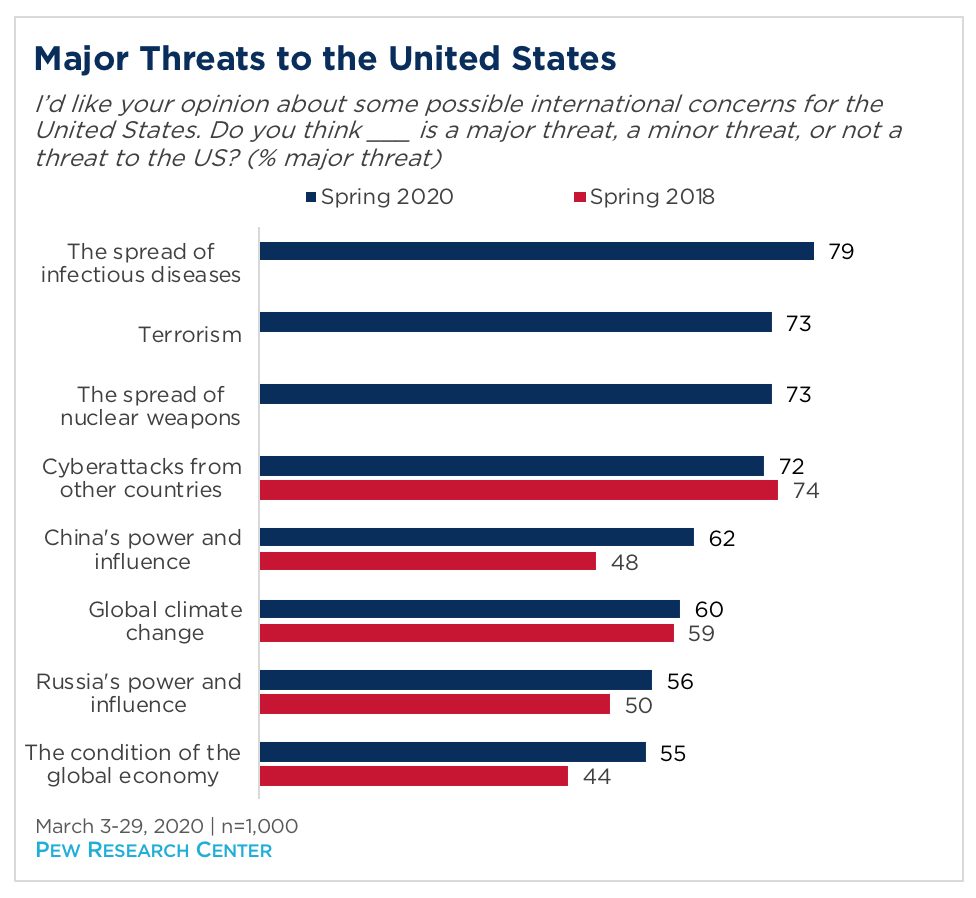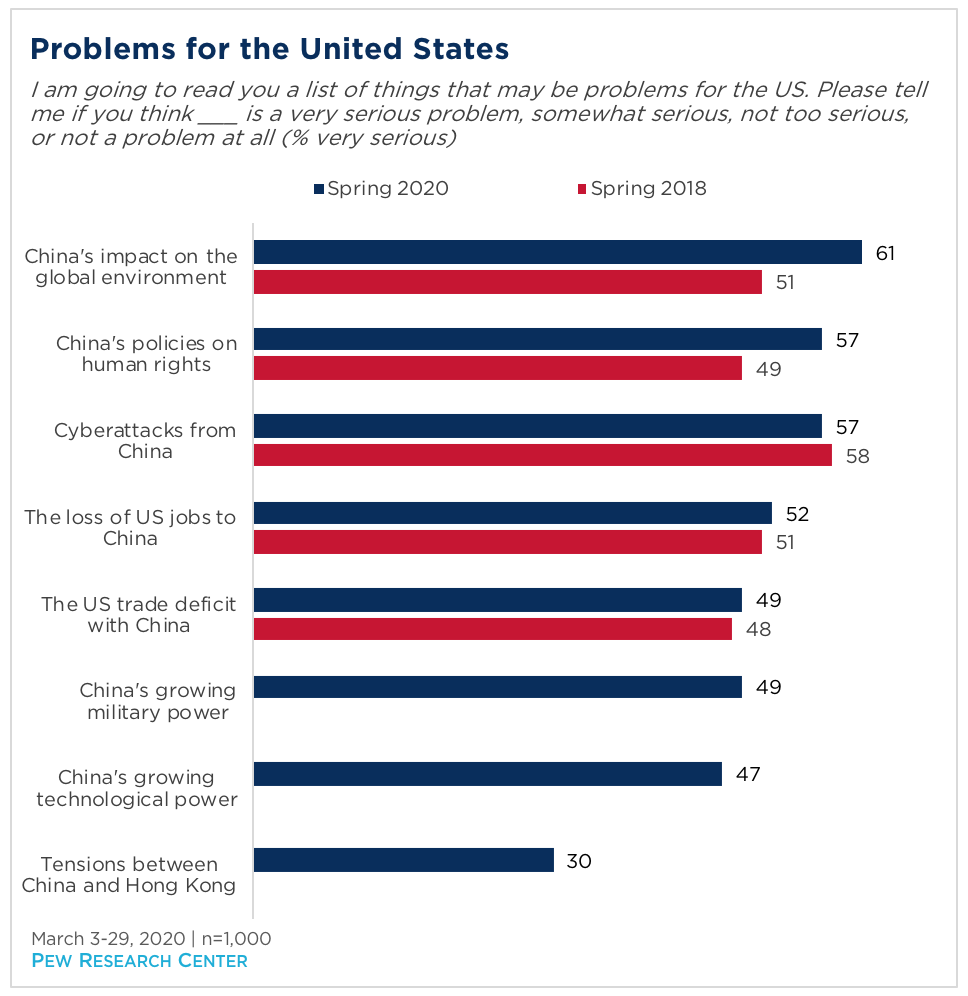Is the Coronavirus Turning Americans Against China?

Americans are generally distrustful of China's handling of international relations, but recent polling finds that Americans have a more negative view on China than ever before.
Americans' Views on China
As followers of the Council’s survey results know, American views of China have been mixed for some time. Americans are generally distrustful of China’s handling of international relations and prefer to maintain alliances with Japan and South Korea overseeing a new partnership with China. But Americans also do not want to contain China’s development as a world power, preferring to pursue a policy of cooperation and engagement.
Findings from the Council’s January 10-12, 2020 survey that four in ten Americans (38%) view China's development as a critical threat to the US fit this pattern as well, and matches how Americans have viewed China since the early 2000s. However, that doesn’t mean that Americans like China—and Pew data shows opinions trending downward.
Pew's latest poll, conducted March 3-29, 2020, finds that Americans are more negative on China than ever before. Two-thirds (66%) say they have an unfavorable opinion of China, up from just 47 percent in 2018, and only a quarter (26%) hold a favorable opinion of China. This growing unfavorability is bipartisan. Seven in ten Republicans and Republican-leaning independents (72%) say they have an unfavorable view of China, up from 51 percent in 2018. Democrats have similarly grown more negative on China over the past two years: six in ten Democrats (62%) say they view China unfavorably, up from 47 percent in 2018.
Rising negative views of China parallel rising concerns about China more broadly. Six in ten Americans (62%) also now describe China’s power and influence as a major threat, up notably from 48 percent in 2018. Though this puts China below other key threats, such as the spread of infectious diseases (79%), terrorism (73%), and the spread of nuclear weapons (73%), more Americans describe China’s power and influence as a critical threat than say the same for Russia’s power and influence (56%).

Americans also name a range of issues in the US-China relationship as very serious problems for the United States. Six in ten Americans (61%) say that China’s impact on the global environment is a very serious problem, up ten points from 2018. China’s policies on human rights also elicit greater concern than two years ago; a majority now describe them as a very serious problem (57%). And roughly half of Americans name economic concerns such as the loss of US jobs to China or the US trade deficit with China as very serious problems, unchanged from 2018.

Is it the Coronavirus Pandemic?
Is this rising level of anti-China sentiment a result of the coronavirus pandemic? It's possible, and the Trump administration has at times gone to great lengths to explicitly connect the COVID-19 outbreak to China. Still, it's difficult to know how the pandemic will affect American views of China as the disease continues to spread around the globe and throughout the US. As the authors of the Pew report note:
The survey took place as the coronavirus outbreak spread throughout the U.S., with several states implementing lockdowns and death tolls multiplying at a rapid clip. While China's handling of the virus may have made an impression on some Americans, it does not appear that escalating conditions in the U.S. over the course of March shifted attitudes toward China during that period. Views of China did not significantly change when comparing those surveyed before and after March 12, approximately when the NBA indefinitely postponed the remainder of the season and actor Tom Hanks announced testing positive for COVID-19 on social media. Americans interviewed prior to March 13, when the U.S. government declared a national emergency, had equally negative views toward China as those interviewed on or after that date, even when holding constant age, education, gender and political affiliation.
Given the public’s concerns about China and negative views of the country, it should be no surprise that US-China relations are also shaping up to be an issue in this year’s presidential election. President Trump has attacked presumptive Democratic nominee and former Vice President Joe Biden as soft on China, with ads attacking "Beijing Biden." Biden’s camp is also on the attack over China, previewing hits on Trump over what Biden adviser Jake Sullivan calls "a colossal gap between tough talk and weak action."
Conclusion
While some are framing the political debate over China and the potential for a more confrontational US-China relationship as a trap laid by Trump to cover up his mishandling of the coronavirus pandemic, that seems mistaken in two ways. First, the timing is incorrect. The pivot among Democrats to taking a harder line on China was apparent as early as 2019, with both liberal and moderate Democratic presidential candidates delivering a common argument: that Trump was right to stand up to Beijing but was doing it the wrong way. Second, if the public is indeed souring on the US-China relationship, as Pew’s March 2020 survey results suggest, taking a harder line vis-à-vis Beijing is not losing political move.
It is also possible that the political debate between Trump and Biden over how to handle China will further increase public concerns, as both candidates raising problems in the relationship may increase their salience for the public. The 2020 Chicago Council Survey, scheduled to field this summer, should provide more information on how the American public views this critical relationship.

